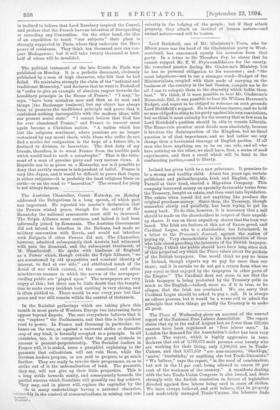Ireland has given birth to a new grievance. It promises
to- be a strong and healthy child. About ten years ago, certain politicians and philanthropists, Irish and English, with Mr.. Parnell at their head, started a Migration Company. This company borrowed money on specially favourable terms from• the Treasury, bought an estate, and then went into liquidation.. The estate when resold did not anything like produce the- original purchase-money. Since then, the Treasury, though• somewhat slowly and painfully, has been trying to get its money back. To do this, however, it is necessary that a call) should be made on the shareholders in respect of their unpaid- up shares. It was on these unpaid-up shares that the loan was based. The Irish are furious at this act of Saxon greed, and' Cardinal Logue, who is a shareholder, has fulminated, in. a letter to the Freeman's Journal, against the notion of paying up. Very characteristic is his denunciation of those who talk about guarding the interests of the British taxpayer.. "Finally, I think the public should have been long since sick of this perpetual cry which the Times raises about the pockets of the British taxpayers. One would think we pay no taxes, in Ireland, though experts say we pay far more than our share; and it is oertain we do not get a return from what we pay equal to that enjoyed by the taxpayers in other parts of- the Empire." The Cardinal does not seem to see that the• Irish taxpayer is being protected by the Treasury quite as much as the English,—indeed, more so, if it is true, as he- alleges, that the Irish are overtaxed. We are sorry that. Cardinal Logue should be asked to pay a call. It is always, an odious process, but it would be a worse evil to admit the principle that when things go badly the Treasury is to make- all good.


































 Previous page
Previous page